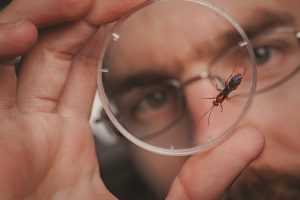Many insects harm crops and cause great devastation for farmers. Lethbridge College agricultural instructor  Jeremy Hummel has been studying one of them – the cutworm – and how to limit the serious crop damage they inflict in the Canadian Prairie provinces. Hummel’s research is just part of a larger project funded by the Canola Council of Canada. He took a break from his work to answer a few questions about the discoveries he’s been making.
Jeremy Hummel has been studying one of them – the cutworm – and how to limit the serious crop damage they inflict in the Canadian Prairie provinces. Hummel’s research is just part of a larger project funded by the Canola Council of Canada. He took a break from his work to answer a few questions about the discoveries he’s been making.
Wider Horizons: What are you hoping to learn through this applied research project with moths and wasps?
Jeremy Hummel: We want to create better recommendations for cutworm management for prairie farmers. Cutworms, which are the larvae of several species of moth, are a significant problem for crop production. They clip off plants in the spring and reduce crop yields, sometimes by very significant amounts – in some case up to 100 per cent. The wasps involved in the research are parasitoids (parasites that eventually kill their hosts). The purpose of this research is to not only eventually create management recommendations that represent best practice for managing cutworms but also best practice for maximizing the populations of the wasps that kill cutworms. Basically the more we work with nature to manage the cutworm problem, the less we need to work against nature.
WH: What does your research look like?
JH: What I do is go out to farmers’ fields to collect cutworms. In the lab on campus, the cutworms are individually placed into containers with an artificial diet to rear them to adults. Eventually, most pupate and then emerge as adult moths. Some, however, die as larvae or pupae. Some larvae are also parasitized and various gruesome events transpire to either the larvae or the pupae if this is the case.
WH: What role has the college played in this research? Are students involved?
JH: The collaborative nature of the project demonstrates our institution’s interest in very practical applied research and a willingness to work with other institutions and stakeholders to bring results that will be useful to the industry. I have also involved individual students and whole classes in the project in classroom and out-of-classroom experiences.
WH: What are the benefits of engaging in applied research as a faculty member?
JH: Research is one effective way to refocus what we as faculty are actually at the college to do – effective training of people to make a difference in our industries and the world. I also think that many of us in academic settings really do want to know, and we recognize that there are a lot of things that no one knows, so research is also a way to discover, and that sense of exploration and discovery is a very exciting and motivating thing. That excitement and passion flows out from the research into the teaching, especially when the discoveries made in the research can be directly applied to aspects of the material being taught or the experiences used in the teaching/learning process.
Members of the college community are welcome to see Hummel’s research lab; email [email protected] to book a tour. Local businesses with a problem that needs to be solved can contact the Applied Research and Innovation office at 403-394-7344.


